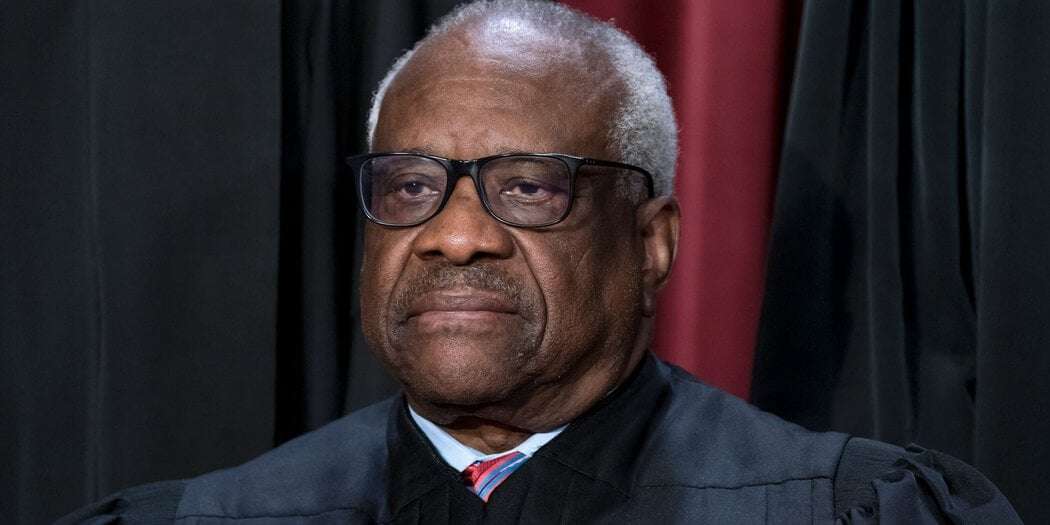You’re reading The Briefing, Michael Waldman’s weekly newsletter. Click here to receive it every week in your inbox.
The Supreme Court keeps tripping over its own robes. Last week, ProPublica revealed that a conservative megadonor has been secretly subsidizing the lifestyle of Justice Clarence Thomas. In a rare public statement, the justice claims he asked others on the Court and in the judiciary, who assured him he need not disclose such beneficence.
It’s not clear which is worse: if this is true, or if it isn’t.
Thomas said all this merely involved “personal hospitality” from a friend (albeit a billionaire who befriended Thomas only after he was appointed to the Court). That might evoke a dinner party or a weekend at a friend’s lake house. Hardly: Thomas frolicked on Harlan Crow’s superyacht, flew on his personal jet, vacationed at his private resort, and traveled with him to Bohemian Grove, an all-male retreat in California. According to ProPublica, the largesse was worth hundreds of thousands of dollars.
Thomas claimed to want to avoid chichi vacations. “I prefer the RV parks. I prefer the Walmart parking lots to the beaches and things like that. There’s something normal to me about it,” Thomas said. “I come from regular stock, and I prefer that — I prefer being around that.” They say hypocrisy is the tribute vice pays to virtue.
This all shows the perils of DIY ethics. The Supreme Court is the only court in the country with no enforceable code of ethics. Sen. Sheldon Whitehouse (D-RI) has pointed out that the Court quickly launched a formal investigation of the leak of the Dobbs decision last year. It could do so again. If the Court will not craft a set of ethics rules — and pronto — Congress can and should do so.
Congress should also investigate. There’s ample precedent: Justice Abe Fortas, too, was found to be receiving support from a wealthy benefactor, and the controversy proved so intense that he resigned.
But beyond stronger rules, the scandal shows how lifetime tenure can engender justices with a startling sense of entitlement and a belief that they are beyond accountability. Thomas almost certainly knows that cavorting around the globe in a superyacht isn’t “personal hospitality” in the spirit of current rules. After briefly disclosing the trips and causing a minor stir in 2004, he decided it would be better to keep them to himself. He was confident he could avoid consequences.
Where did that confidence come from? At least in part from the assurance that comes with years of accumulated power and influence.
Few government jobs anywhere in the world are quite like that of U.S. Supreme Court justices: nine unelected people who dictate wide swaths of national policy. And if they’re put on the Court at a young age, they get to do so for many decades with no real risk of removal. Only one justice has ever been impeached (Samuel Chase in 1804). None has ever been convicted. Supreme Court justices are, in this way, more akin to royalty than public servants. Only a single U.S. state mirrors the federal system — the rest have either fixed terms or mandatory retirement.
We can make a change, as I recently argued in the Los Angeles Times. There is a broad bipartisan consensus in favor of term limits for Supreme Court justices. Justices would serve for up to 18 years, with each president allowed two appointments per presidential term. I describe all this in my upcoming book, The Supermajority: How the Supreme Court Divided America.
Term limits would ensure that the composition of the Court better mirrors the preferences of American voters and stop presidents from influencing national policy decades beyond their terms in office. Term limits would also prevent any individual from accumulating unaccountable power, as Thomas seems to believe he has.
George Washington understood the rationale when he stepped away from the presidency after two terms, establishing a norm that no public official should hold that much power for too long. When presidents stopped complying with that norm, it was written into law. It’s time to bring the same accountability to the Supreme Court.

PitbullMandelaEffect on April 13rd, 2023 at 19:57 UTC »
They should make everyone in America a Supreme Court Justice.
Frankie6Strings on April 13rd, 2023 at 19:35 UTC »
They thought it was bad to legislate from the bench, so they decided to legislate from the bench. They thought the media was biased, so they invented a more biased media. Too much gun violence? The answer is clearly more guns. I sense a pattern.
meatball402 on April 13rd, 2023 at 19:26 UTC »
Any binding code of ethics would be ruled unconstitutional by these hacks.
You'd need an amendment.